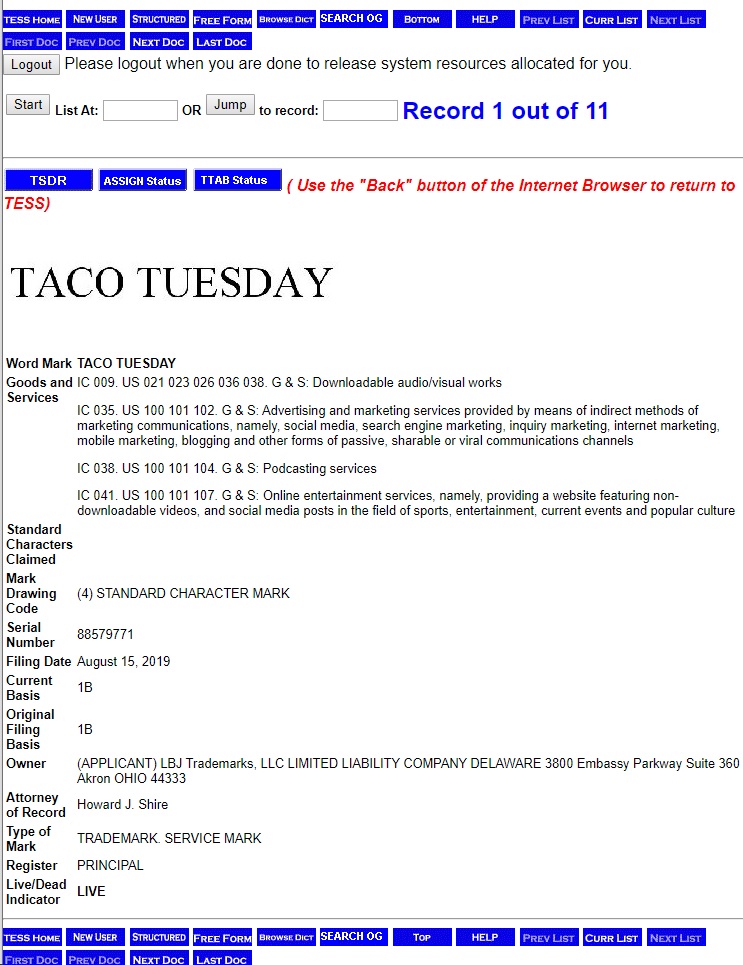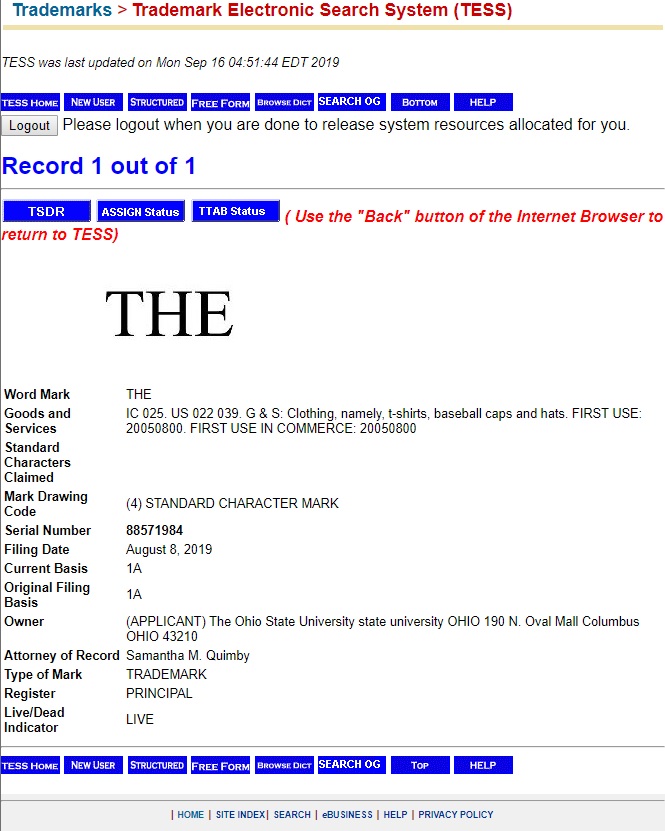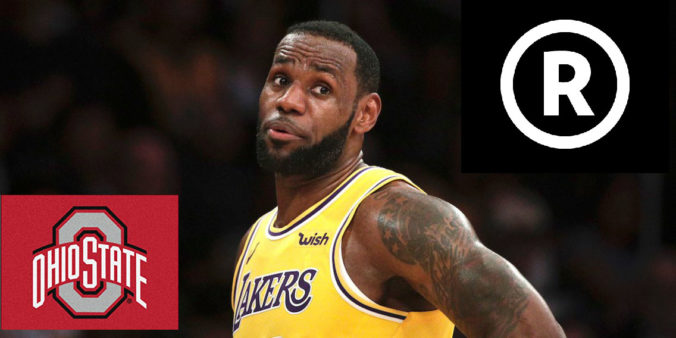Trademark law is quirky. Look no further than the attention being given to recent filings to the USPTO by LeBron James and Ohio State University. TACO TUESDAY and THE. These legal matters are receiving substantial media coverage. But the subsequent news blurbs, articles, and media stories all seem to have one important thing in common:
Nearly everyone is wrong about what is going on here.
At this point, I expect ESPN and Darren Rovell to fail at describing the intricate proceedings of trademark matters. That much is a given. It is everyone else piling on these stories that is making me nervous. Accordingly, to address these issues, and because the internet practically runs on top 10 lists, here are 10 misconceptions about LeBron and Ohio State’s trademark filings.
1. “LeBron wants to trademark TACO TUESDAY”
Wrong. Just for starters, “trademark” is not a verb. Anyone using the term “trademark” to describe a process is probably someone who does not know what they are talking about. Even used colloquially, it is dangerous to describe trademark filings with the USPTO in such a way.
LeBron filed an intent-to-use application to register TACO TUESDAY as a trademark with the USPTO. Trademarks and trademark registrations are substantially different things. Trademark rights attach the moment you use a mark in commerce to identify a source of goods/services. Before you can get a registration, you have to demonstrate to the USPTO that you already have these trademark rights in a particular word, phrase, or logo. It is a prerequisite.
(The same applies to Ohio State seeking to register THE. The only difference is that Ohio State claims that it already has acquired trademark rights and that the mark is currently in use.)
2. Ohio State cannot get a trademark for a definite/indefinite article
Again, Ohio State University is not asking the USPTO for a trademark. It is asking for a trademark registration. The USPTO does not grant or deny trademarks.
Nevertheless, the definite/indefinite article aspect is trickier. There is no law that precludes seeking trademark rights in a definite/indefinite article, however. If the simple word THE somehow manages to convey to the consuming public that Ohio State University is the source of goods or services emanating from that word, there may be trademark rights that attach. Not unlike Gene Simmons’ attempt to register a devil horns hand gesture, in theory it is possible to acquire trademark rights here. It is just highly unlikely.
3. LeBron cannot get a trademark for TACO TUESDAY because someone else already has that trademark
This is only partially true, but very misleading at the same time. Yes, there is an existing registration for TACO TUESDAY®. In fact, there are two. Gregory Hotel, Inc. acquired a registration for TACO TUESDAY (U.S. Registration no. 3621366) on May 19, 2009 for restaurant services. Prior to that, Taco John’s Seasonings LP acquired a registration for TACO TUESDAY (U.S. Registration no. 1572589) on December 19, 1989, also for restaurant services. These two registrations are subject to a concurrent use agreement between the parties, limiting Gregory Hotel’s uses to the State of New Jersey.
Multiple people and entities can own trademark registrations (and enforce trademark rights) for identical words and phrases. That is why the USPTO requires an applicant to identify the specific nature of the goods or services being associated with a trademark. There are 45 different “classes” of goods and services to help distinguish these marks. If I have a trademark registration for XYZ in clothing (Class 25), someone may also have the complete right to acquire a registration for XYZ in Class 43 for hotel services. The standard is whether or not it would be likely to confuse the consuming public. An issue that is decided on a case-by-case basis.

4. Ohio State cannot trademark THE because then I would not be able to use the word “the”
This is not how trademarks work. A trademark is a word, phrase, symbol, and/or design that identifies and distinguishes the source of the goods of one party from those of others.[1] Unlike patents, if I own a trademark for XYZ, that does not give me the legal right to preclude you from saying or using the word XYZ. A trademark registration does not give me the right to exclude, no matter how much the NFL wants people to not use the term “Super Bowl” unless they are a licensee or sponsor. The concepts of nominative and descriptive fair use exist to avoid such a draconian application of trademark rights against the public.
Acquiring a registration for THE would only give Ohio State University the right to object if a competitor used the term in a manner that would cause confusion among the relevant consuming public. That is essentially what the concept of “infringement” is under trademark law. Trademark rights exist to protect the public interest from confusion.

5. You cannot trademark common words or phrases
Nearly every trademark is derived in some form or fashion from a “common word or phrase.” The biggest company in the world uses a common word as its trademark. You might recognize it: APPLE®. Only in rare instances are trademarks entirely made up terms or phrases. The most common example here is EXXON®, and it is generally considered one of the strongest trademarks in existence precisely because it is a made up word.
6. LeBron James filed for TACO TUESDAY “to ensure LeBron cannot be sued for any use of ‘Taco Tuesday’.”
Baffling. This may actually be LeBron’s intent – but this is not how trademarks work or how the legal process for enforcing trademarks operates in the real world. If LeBron’s application to register TACO TUESDAY for podcast services and online entertainment services fails, that does not act as some form of shield against future legal actions. If this is what his advisers are telling him, he needs better representation.
One of the beauties of trademark law is that it is dynamic. It is constantly in flux. What may be a trademark one day can become generic the next. Did you know ZIPPER used to be a trademark? It was, but now it is deemed generic as being inherently descriptive for the entire genus. Even if LeBron secures a registration for TACO TUESDAY in 2019, he can lose any such rights in 2020 if he abandons the mark and stops using it in commerce. A trademark filing will not overcome that act. Things can change.
Meanwhile, if LeBron suddenly starts using the term TACO TUESDAY in commerce to compete against Taco John’s in the area of restaurant services, he can expect a lawsuit. And he can expect to lose.
7. LeBron cannot trademark TACO TUESDAY because he did not invent it
Invention is a concept that applies to patent law, not trademarks. You do not need to be the first person to coin a term or phrase to claim trademark rights. You need only use the term in a manner whereby the public associates your particular goods and services with that term or phrase. It really is that simple.
Priority of use is the important distinction in trademark law. Not invention.
8. Ohio State cannot trademark THE because it is not inherently distinctive
It is true that in the abstract, the word THE is not distinctive. But that does not end the analysis. In trademark law, words that are merely descriptive can go through the process of acquiring distinctiveness through what is known as “secondary meaning.” The strength of a trademark is graded on a sliding scale or spectrum, from generic, to merely descriptive, to descriptive (with secondary meaning or acquired distinctiveness), to suggestive, and then to arbitrary/fanciful.
Marks that are suggestive, arbitrary, or fanciful are considered “inherently distinctive.” EXXON® once again being the best example of a fanciful mark that is inherently distinctive and strong.
9. The USPTO fully rejected the applications for TACO TUESDAY and THE
No. This is absolutely not true. At least not as of today.
Both LeBron and Ohio State received initial refusals to register their respective marks. That is it. TACO TUESDAY received an Office Action on September 11, 2019. It is a *NONFINAL* action that identified two areas whereby the USPTO subsequently provided guidance to LeBron for how to overcome the initial refusal.
The USPTO issued this action to make sure that there is no confusion between an existing registration for TECHNO TACO TUESDAY® and LeBron’s pending application. Notably, this was only as it applied to Class 35 (advertising and marketing services). Nor does it reference the other TACO TUESDAY® registrations previously discussed, because those are in a different class and for different goods and services (restaurant services).
Additionally, the USPTO issued the first refusal on the grounds that LeBron’s proposed mark fails to function as a trademark. This means that that the application failed to identify how TACO TUESDAY would be used to identify a specific source of goods or services. This is where the “commonplace term” misconception appears to be derived. You can register a commonplace term as a trademark, but you have to be able to use it in a way that the public ties that use to specific goods or services. LeBron is now given an opportunity to submit arguments that would demonstrate how it would rise above being a mere commonplace term for his podcast and other proposed goods/services.
It is not a final or complete rejection of the application.
Likewise, also on September 11, 2019, the USPTO issued a *NONFINAL* Office Action and a first refusal of Ohio State’s application because of a prior-filed application. Yes, believe it or not, Marc Jacobs already filed an application for THE (Application no. 88416806) in an overlapping class of goods before Ohio State filed its pending application. This is the primary basis for the initial refusal. Like LeBron’s application, however, Ohio State has the opportunity to respond and provide evidence that its THE mark would not conflict with Marc Jacobs’ co-pending THE mark.
The USPTO also initially refused Ohio States’ application on grounds that it fails to function, but because it is deemed “merely ornamental” and is purely decorative for clothing. This is a common refusal when applying for registrations for clothing, especially t-shirts. The USPTO, however, provided a step-by-step guidance for how to overcome this initial refusal, including submitting a new specimen and/or submitting evidence of distinctiveness (customer recognition – this is usually done by survey evidence).
Once again, it is not a final or complete rejection of the application.
Both LeBron and Ohio State have six (6) months to respond to these respective Office Actions.
10. These are legal rulings precluding any trademark rights to LeBron or Ohio State
The USPTO is an administrative body. It is not a court of law. With regard to LeBron and Ohio State University, the USPTO only has the ability to determine whether or not to grant a federal trademark registration(s). That is the entire scope of the task. It will not issue any advisory opinions on whether or not LeBron or Ohio State have acquired common law trademark rights or even geographic rights based on particular areas of use. That is not what this process is for.
These applications are each being handled by one examining attorney. If in the future someone sues LeBron and/or Ohio State (or vice versa), the opinions of the USPTO and the examining attorney are at most persuasive authority but they are not considered binding precedent or settled law on the matter. It may make for decent clickbait on Darren Rovell’s twitter feed, but it is not to be considered a full resolution of trademark rights with respect to these terms.
In conclusion: while unlikely, it is still possible for
LeBron and Ohio State University to acquire federal trademark registrations for
TACO TUESDAY and THE, respectively. Yes, really.
[1] The term “trademark” is often used in a general sense to refer to both trademarks and service marks.

Recent Comments